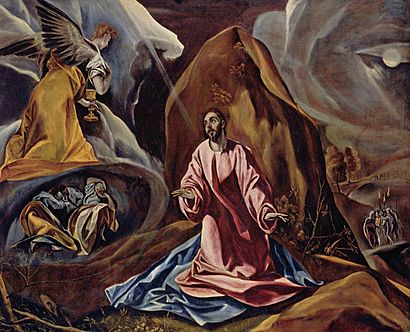Agony in the Garden (El Greco, London) facts for kids
Quick facts for kids Agony in the Garden |
|
|---|---|
 |
|
| Artist | El Greco |
| Year | 1590 |
| Medium | oil on canvas |
| Dimensions | 102 cm × 131 cm (40 in × 52 in) |
| Location | Toledo Art Museum, Toledo, OH |
Agony in the Garden is a famous painting from 1590. It was created by the well-known artist El Greco or his art studio. This artwork was made during his second time living in Toledo, Spain.
The painting still shows how much Titian, another great artist, influenced El Greco's style. Today, you can see this painting at the Toledo Art Museum in Toledo, Ohio.
The painting shows a scene with Christ in the front on the left side. An angel appears to him, holding a special cup called a chalice. In the background on the right, you can see Judas and a group of soldiers. They are coming to arrest Christ. The landscape around them looks dry and has no plants.
Contents
What is 'Agony in the Garden'?
This painting shows a moment from the Bible. It's when Jesus prays in the Garden of Gethsemane before his arrest. The word "agony" means extreme suffering or pain. The painting captures this deep emotional moment.
Who Was El Greco?
El Greco was a Greek painter, sculptor, and architect. He was born in Crete, which was part of the Republic of Venice at the time. He later moved to Spain and became famous there. His real name was Doménikos Theotokópoulos, but everyone called him El Greco, which means "The Greek."
- He is known for his unique style.
- His paintings often have long, thin figures.
- He used bright, unusual colors in his art.
- El Greco's work is part of the Mannerism art movement.
What Does the Painting Show?
The painting focuses on a few key parts of the story.
The Angel and Jesus
On the left, an angel brings a chalice to Jesus. This chalice often represents the suffering Jesus is about to face. The angel's presence offers comfort and strength during this difficult time.
Judas and the Soldiers
In the distance, you can see Judas leading soldiers. They are coming to take Jesus away. The dry, empty landscape adds to the feeling of loneliness and sadness in the scene.
See also
 In Spanish: La oración del huerto (El Greco, Londres) para niños
In Spanish: La oración del huerto (El Greco, Londres) para niños
- List of works by El Greco
 | Stephanie Wilson |
 | Charles Bolden |
 | Ronald McNair |
 | Frederick D. Gregory |

